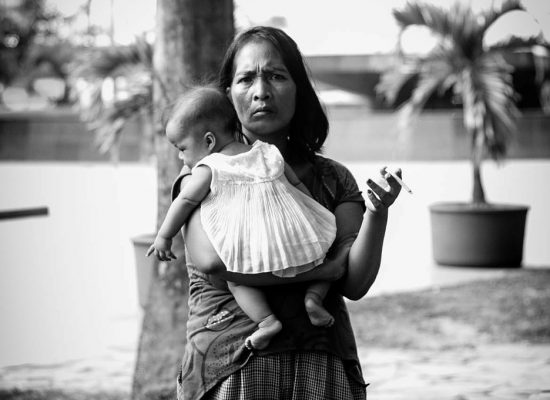Smoking in pregnancy and in the postpartum

Smoking during your pregnancy can cause some serious complications such as:
- Increased risk of miscarriage
- Low birth weight
- Premature birth
- Stillbirth
- Sudden unexpected infant death (SIDS)
- 40% increased chance of infant mortality
- Your baby has an increased chance of respiratory health problems like asthma, bronchitis and pneumonia as well as problems with the ear, nose and throat
- Association with psychological problems in childhood like ADHD and disruptive behaviour, as well as a negative impact on your child’s educational performance
Why quit?
We recommend all pregnant clients and their partners quit smoking, rather than cutting down on smoking, during their pregnancy and after their baby arrives. Not only will smoking reduce the risks listed above, but it will also benefit your own health, as you will be less likely to develop lung cancer, heart disease, stroke and chronic lung disease. Other benefits to quitting include more energy, easier breathing, and everything will smell better including you and your home. Your food will taste better, and you will have more money to spend on other things!
Second hand smoke:

This term refers to other people who smoke around you or your baby. Second hand smoke can cause harmful effects to a pregnant person and her baby. Breathing even a bit of smoke can be harmful. Your baby will be at risk of:
- Being smaller at birth,
- Developing ear infections
- Having asthma and bronchitis
- SIDS (sudden infant death syndrome)
- Having colds and pneumonia
Protect yourself and your children by attempting to make your environment as smoke free as possible. If your partner or other family members smoke, ask them to smoke outside, wash their hands after smoking, keep doors and windows closed to prevent smoke from coming inside and change outdoor clothing after smoking.

How can I get help to quit?
There are many free resources, groups, help lines and aids to help you or/and your partner to quit smoking.
- Smoker’s helpline 1-877-513-5333 smokershelpline.ca
- Middlesex Health Unit – Quitting Smoking
- Pregnets
- Expecting to quit
Tips:
- Drink water with crushed ice if possible
- Deep breathe – Take a deep breath, hold for two seconds, then let it out
- Delay the urge to smoke – put it off for a few minutes
- Do something else – try a different activity
- Keep a dairy of how much and where you smoke
- Get support from friends, family and/or professionals
- Make your home and car smoke-free
Facts:
- Smoking takes up a lot of your time. For people who smoke a pack a day – you will spend 4 hours a day smoking (based on 10 min/smoke). That is 60 days every year.
- For people who smoke a pack a day, they will spend over $1100 (based on $20/week) for contraband tobacco (clear bags) and $4160 (based on $80/week) for premium brand cigarettes each year.
- Cigarette butts are the most common type of litter.
- Many people are ashamed to smoke, mostly around children or other people who do not smoke.
- Tobacco companies use sneaky advertising that leads people to smoke.
- Tobacco kills three times more Canadians each year than alcohol, AIDS, illegal drugs, car accidents, suicide, and murder all combined.
Breastfeeding and Smoking -
Even if you do smoke, we still encourage you to breastfeed your baby. The benefits of breastfeeding outweigh the harmful effects of tobacco on your baby’s health. Try to cut down on the number of cigarettes you smoke, change your clothes after smoking before touching your baby, wash your hands after smoking and have a smoke free home and car.
What about e-cigarettes (vaping)?
E-cigarettes have not been fully tested for safety and we do not advise these during pregnancy or in the postpartum. We encourage you to quit smoking in all forms during pregnancy, and follow the rules of smoking outside away from baby during the postpartum should you choose to use e-cigarettes.
Health Canada warns people not to buy e-cigarettes as they have unknown health risks.
Will I start smoking again after my baby's birth?
Maybe. But now you have the skills and motivation you need to rebound from a relapse or resist temptation and quit for good.
If you quit smoking before or during pregnancy, it’s especially important for you to make a plan to make sure you don’t relapse after your baby’s birth. As many as 8/10 people will start smoking again.
Once your baby is born, consider the benefits of not exposing your baby to harmful second or third hand smoke that is in the air and gets trapped in your home.
You’re are feeling overwhelmed. Bills are piling up. The baby didn’t sleep overnight. In these moments, a cigarette appears to offer short-term relief – even when you know in the long run it is harming your health. Make a short-term list of reasons not to light up and keep it handy. Some examples:
“Each day I remain smoke free, I will live longer.”
“I don’t have to fear for my future health, or my children’s future health.”
“My kids aren’t exposed to second hand smoke.”
“I like being a healthy role model for my kids better than being an unhealthy role model.”
“I’m saving money.”
Why having one smoke is not a setback!
If you slip up and smoke, try to understand what was happening and how you felt at the time. Recognize relapse is normal and does not mean you have failed. The more times you keep trying, the more likely you are to be successful.
- Celebrate all the time you’ve spent not smoking.
- Figure out what prompted you to smoke, and decide how to manage it the next time.
- Remind yourself immediately of the benefits to you of quitting for good.
What makes me want to smoke?
Mistakes happen, but know a single puff increases your chances of a full relapse. When you feel the urge, remember your list of short-term reasons not to smoke again, and then problem-solve these common traps.
Negative Mood –
Remind yourself what you love about being a non-smoker.
- Take your baby for a stroll or exercise
- Call, text, or email a supportive friend or family member, or a help line.
- Take care of yourself in whatever way is comforting – enjoy a favourite meal, have a warm bath, take a nap.
- If you feel depressed, don’t hesitate to talk to your midwife or family doctor.
Being around other smokers –
- Establish smoke free zones such as where you live.
- Leave smokers when you feel the urge to join in, and ask smokers not to smoke around your baby.
- Talk to other ex-smokers about how they handle situations when they are around other smokers.
Triggers –
- Plan to put your health first in those situations that prompt cravings, such as an argument with your partner or feeling stressed.
- Change your routine to avoid triggers, such as brushing your teeth after meals.
- Try new activities to distract yourself such as knitting, listening to music, reading to your baby.
Time Pressures –
Taking care of your baby each day is a lot of work with sometimes no breaks and little sleep. They can make you want to reach for a cigarette for comfort or a quick break. When possible, arrange for help so you have time to yourself.
References:
- CDC smoking in pregnancy
- SOGC – Clinical practice guideline (2017) on substance use in pregnancy
- NICE guidelines (U.K. 2010)
- Ontario prenatal education
- Dads in Gear – promoting smoke free dads.
- Expecting to quit – resources for smoking cessation
- Adapted from materials from the Canadian Cancer Society (CCS), Centre of Addiction and Mental Health (CAMH), the Government of Ontario and the Canadian Council for Tobacco Control.
